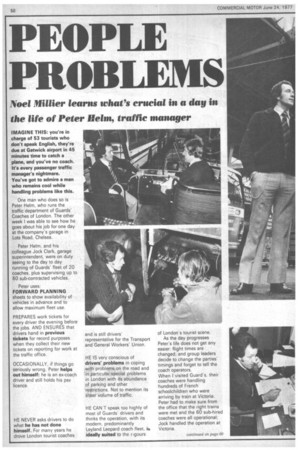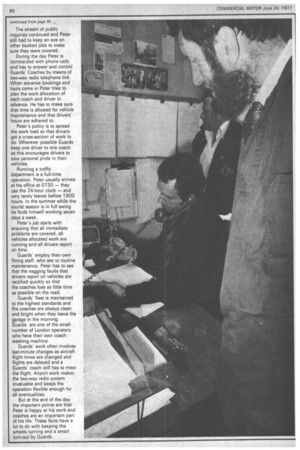PEOPLE PROBLEMS
Page 60

Page 62

If you've noticed an error in this article please click here to report it so we can fix it.
Noel Milner learns what's crucial in a day in the life of Peter Helm, traffic manager
IMAGINE THIS: you're in charge of 53 tourists who don't speak English, they're due at Gatwick airport in 45 minutes time to catch a plane, and you've no coach. It's every passenger traffic manager's nightmare.
You've got to admire a man who remains cool while handling problems like this.
One man who does so is Peter Helm, who runs the traffic department of Guards' Coaches of London. The other week I was able to see how he goes about his job for one day at the company's garage in Lots Road, Chelsea, Peter Helm, and his colleague Jock Clark, garage superintendent, were on duty seeing to the day to day running of Guards' fleet of 20 coaches, plus supervising up to 60 sub-contracted vehicles, Peter uses: FORWARD PLANNING sheets to show availability of vehicles in advance and to allow maximum fleet use.
PREPARES work tickets for every driver the evening before the jobs. AND ENSURES that drivers hand in previous tickets for record purposes when they collect their new tickets on reporting for work at the traffic office.
OCCASIONALLY, if things go seriously wrong, Peter helps out himself: he is an ex-coach driver and still holds his psv licence.
representative for the Transport and General Workers' Union,
HE IS very conscious of drivers' problems in coping with problems on the road and in particular special problems in London with its abundance of parking and other restrictions. Not to mention its sheer volume of traffic.
HE CAN'T speak too highly of most of Guards' drivers and thinks the operation, with its modern. predominantly Leyland Leopard coach fleet, is ideally suited to the ngours
of London's tourist scene.
As the day progresses Peter's life does not get any easier: flight times are changed; and group leaders decide to change the parties' timings and forget to tell the coach operators.
When I visited Guard's, their coaches were handling hundreds of French schoolchildren who were arriving by train at Victoria. Peter had to make sure from the office that the right trains were met and the 60 sub-hired coaches were all operational; Jock handled the operation at Victoria. The stream of public inquiries continued and Peter still had to keep an eye on other booked jobs to make sure they were covered.
During the day Peter is bombarded with phone calls and has to answer and control Guards' Coaches by means of two-way radio telephone link. When advance bookings and tours come in Peter tries to plan the work allocation of each coach and driver in advance. He has to make sure that time is allowed for vehicle maintenance and that drivers' hours are adhered to.
Peter's policy is to spread the work load so that drivers get a cross-section of work to do. Wherever possible Guards keep one driver to one coach as this encourages drivers to take personal pride in their vehicles.
Running a traffic department is a full-time operation. Peter usually arrives at his office at 0730 — they use the 24-hour clock — and very rarely leaves before 1900 hours. In the summer while the tourist season is in full swing he finds himself working seven days a week.
Peter's job starts with ensuring that all immediate problems are covered, all vehicles allocated work are running and all drivers report on time.
Guards' employ their own fitiing staff, who see to routine maintenance. Peter has to see that the nagging faults that drivers report on vehicles are rectified quickly so that the coaches lose as little time as possible on the road.
Guards' fleet is maintained to the highest standards and the coaches are always clean and bright when they leave the garage in the morning.
Guards are one of the small number of London operators who have their own coach washing machine.
Guards' work often involves last-minute changes as aircraft flight times are changed and flights are delayed and a Guards' coach still has to meet the flight. Airport work makes the two-way radio system invaluable and keeps the operation flexible enough for all eventualities.
But at the end of the day the important points are that Peter is happy at his work and coaches are an important part of his life. These facts have a lot to do with keeping the wheels turning and a smart turn-out by Guards.




































































































